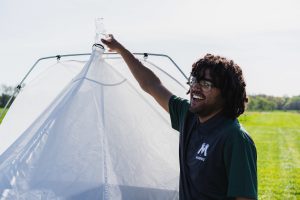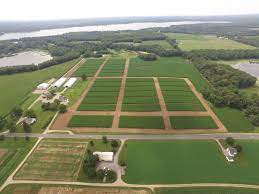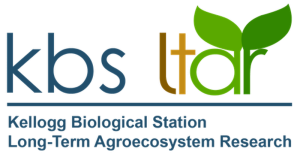
DeShae Dillard, 2024 KBS LTAR mentor
Description: This research internship opportunity is for a current undergraduate student to work in the Kellogg Biological Station’s Long-Term Agroecosystem Research (KBS LTAR) site in summer 2024. The ideal candidate will have a general enthusiasm for agroecology field crop research – see the full internship description below.
The summer 2024 KBS LTAR Research Experience for Undergraduate (REU) internship will allow you to learn the process of research: reading literature, formulating questions and hypotheses, designing a study, writing a research proposal, collecting and analyzing data, and presenting your results. Interest in conveying research findings to a general audience is important. A collaborative and team-oriented group of researchers at KBS will provide research support and feedback when necessary and expose the student to a diverse range of projects. The intern will have the opportunity to participate in a variety of professional development activities in addition to their research project.

2024 LTAR REU Internship Description
The LTAR REU will be mentored by DeShae Dillard, a graduate student in the Landis Lab at MSU.
From DeShae:
“My research is focused on the effect of agricultural management and conservation practices on fly diversity to promote a broader understanding of the ecosystem services being provided in agroecological landscapes. I study flies in annual row cropping systems of Michigan to optimize agricultural production with insect diversity using sustainable intensification. I aim to impart my enthusiasm for the agricultural sciences to others and support the development of diverse communities in science.”
Agricultural management and conservation strategies reduce soil disturbance, enhance plant diversity, and integrate perennial crops and native habitats, but their specific effects on Diptera communities remain poorly understood. Consequently, the implications of these practices on key ecosystem functions performed by Diptera, namely pollination and decomposition, remain unclear. In summer 2024 we will continue work from 2023 sampling fly communities within the Long-Term Agroecosystem Research Aspirational Cropping Systems Experiment located at the Kellogg Biological Station (https://www.canr.msu.edu/ltar/)
In addition, we will expand our research questions to quantify pollination and decomposition services provided by flies in annual row cropping systems. As an intern, you would work to develop an independent research project which could include exploring piloting methods for evaluating surface litter decomposition or isolating the impact of early-season fertilizer applications on fly abundance.
2024 Objectives:
- Quantify the abundance and diversity of flies among annual row crops and restored native grassland to determine the impact of sustainable intensification.
- Characterize the community of Diptera and Hymenoptera floral visitors in insect-pollinated row crops and restored native grassland.
- Evaluate the decomposition rate of surface litter among sustainably intensified and conventional annual row crops.
What will you need to apply for the KBS LTAR Research Internship Opportunity?
- Ability to participate in the entire 10-week program (May 19- July 27, 2024)
- A PDF of your transcripts (unofficial is fine)
- A PDF of your current resume or CV
- Contact information for one reference (no formal letter of references is required. We will notify you before contacting any listed references)
- A Statement of Research Interest (300 words max) that describes your interest in research at KBS
- A Personal Statement (300 words max) that describes your goals and background
Full Program Details:
Eligibility:
Dates:
This program is 10 weeks long and will run from May 20 – July 26, 2024 (students are expected to arrive on-site by 5 p.m. Sunday, May 19 and depart Saturday, July 27). Interns will be based at the Kellogg Biological Station in Hickory Corners, Michigan.
Hours:
This is a full-time (40+hrs/week) research experience. Specific hours will be arranged with your research mentor.
COVID Policies:
All program participants will be required to comply with the most current Michigan State University COVID-19 policies.
Financial Support:
- $6000 stipend + room & board at KBS- note that our dining hall will not be open for regular service. We provide a weekly grocery stipend and all apartments are equipped with kitchens. The $6,000 stipend as well as grocery stipend are paid in two lump sums, at the start and midpoint of the program
- Up to $600 to cover transportation to and from KBS (note MSU can only reimburse drivers up to $500 in mileage)
- Up to $250 for research expenses
Learning Plan and Professional Development:
You will will work with your mentor to create a custom learning plan and develop an independent research project, collaborate to write a research proposal, attend weekly professional development seminars, develop an “elevator speech” about your research, write a research abstract and present a professional research poster at the KBS Summer Undergraduate Symposium, plus write a professional blog post about your research experience.
Our weekly professional development seminars cover topics like science communication, crafting a CV/Resume, and more. We also host grad panels and career panels to help students learn about a variety of STEM career options.
Field Trips and Activities:
Weekends at KBS are all about exploring. Students will take field trips to the John Ball Zoo, museums in Ann Arbor, the Saugatuck Dunes on Lake Michigan, and more! Activities closer to KBS include browsing the Farmer’s Market in Kalamazoo, bowling, birding, and kayaking on Gull Lake. Our resident mentors organize weekly activities that will appeal to a variety of interests.
Questions? Please contact KBSSummer@msu.edu for any questions about this opportunity or the application.


A legacy of conservation; a commitment to sustainability.
3700 E. Gull Lake Drive
Hickory Corners, MI 49060
(269) 671-5117
info@kbs.msu.edu